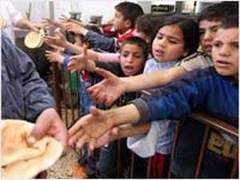One of the direct reasons for the French Revolution of 1789 was the high price of Bread and its scarcity.
Bread is considered an essential food and from it comes the term “Bread Winner” (a person who earns money and supports his family). In the Bible it is referred to as The “Staff of Life” and its importance dates back to the Ancient Egyptians and Romans.
The importance of bread is also stressed in the last supper of Christ when he broke a piece of bread and passed it amongst his disciples – the broken bread symbolic of his body that was to be broken on the cross.
Bread cost and availability has been a factor in most revolutions and social upheavals. In Egypt in 2011 in Tahrir Square along with pictures of Nasser bread was raised as a symbol of their demand for equality and the right to live above the poverty line. It is almost as if bread defines the needs of humanity. It defines societies division into classes.
In Syria bread is a main food component due to its low cost. It is eaten with every meal ( bread is hardly ever thrown away even dried bread is put to use) Bakers use a particular kind of flour which has protein added to it. The loaves are big- more than twice the size of pitta bread available in Western supermarkets. These loaves are then baked with incredibly high heat. The result is delicious tasting cheap bread. It is to be noted that a common complaint amongst refugees was their inability to get used to non Syrian bread.
Building numerous bakeries was one of the earlier steps that was taken by late President Hafez Al Assad. In Syria bread availability is a measure of the stability of the country. This has been so historically and is true up till now.
In 2011, when the war started in Syria, terrorist attacked and destroyed many government institutions including bakeries. In Adra a province of Damascus a painful incident happened- one that will remain in the memories of people for a long time. Terrorists attacked the local bakery there and in a scene taken out of the fairytale Hansel and Gretel and the witch the workers of the bakery were thrown in the oven and left there to roast to death. The aim, was for bakeries to close, for bread to become scarce and for hunger to arrive at the doorsteps of Syrians.
This happened up to a point in Gouta and other places. Fear and repression imposed by terrorists on the locals resulted in bakeries being closed and bread if available, was available on the black market.
It was a ploy used by terrorists in that area to push the people to the very edge of the precipice where jumping over the edge would be easier than living on the edge.
The Syrian government was well aware of what was happening and tried to overcome this problem and they succeeded partly. It should be noted at this point that Syrian bread is incredibly cheap. Ten loaves cost fifty Syrian liras the equivalent of ten cents- one tenth of a dollar. The reason is that the government heavily subsidizes bread in that it subsidizes flour and it subsidizes the fuel used to work the ovens. Had the government not heavily subsidized bread the ten loaves would have cost approximately 350 Syrian liras that is the equivalent to 70 cents- still cheap by world standards but difficult for a certain class of Syrians. To overcome the problem of the siege imposed by armed groups on certain areas the government decided to continue to allow subsidized flour and subsidized fuel to enter to these areas. Government bakeries were of course shut down by terrorists, but private bakeries (all with a government license) still operated -hence the irony- the very same terrorists who shut down government bakeries now ate from private owned bakeries bread subsidized by the government.
However sometimes the subsidies never reached those terrorist besieged areas, for the flour and fuel were stolen by terrorists and sold for exorbitant prices. Civilians became gaunt while the terrorists grew in size looking beefy as is obvious in all film material that shows them. It was these discontented civilians that played a role in ousting the terrorists who had hungered them.
During the crisis that started in 2011 the government had to ration many items but bread was never one of them. On the contrary more bakeries were opened and additional shifts were introduced so that bakeries stayed open more hours. Up till today Syria remains one of the cheapest countries in the world when it comes to the price of bread – and so reinforcing support from local populations.
And so bread a symbol of the word of God, of fecundity and normality was rarely absent from a Syria torn by a war, carried out on it, by Takfiri terrorists.
Reem Haddad
Editor in Chief

